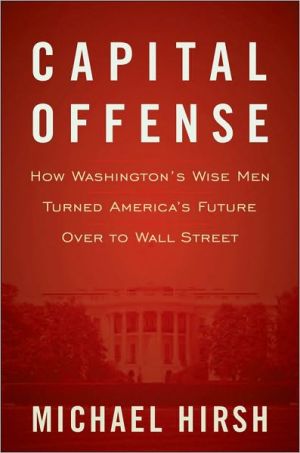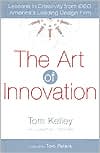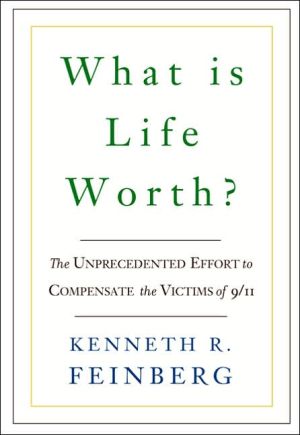Capital Offense: How Washington's Wise Men Turned America's Future Over to Wall Street
Advance Praise for Capital Offense\ "To understand the slow, steady shift of power from Washington to Wall Street, you have to connect the dots year by year, across decades. For that you need a seasoned veteran like Mike Hirsh, who has used deep sourcing, a long memory, and his razor-sharp critical sensibilities to show how the tide slowly turned from public good to private gain. In this amazing book, Hirsh shows definitively how Wall Street won and America lost."\ —Ron Suskind, author of The...
Search in google:
For the last thirty years, it has been the mantra of Washington, Wall Street, and economic academia: The fastest way to economic growth is to make financial markets happy. The few economists and government watchdogs who took exception to this theory or pointed out some of the dangerous trends that accompanied it were either castigated, dismissed as cranks, or ignored. How could this happen? How could five successive presidents from both parties pursue and expand an economic policy that hollowed out the American economy and produced the worst economic catastrophe since 1929?In Capital Offense, Newsweek's Michael Hirsh takes you inside the lives of the key people who gave us this era of free-market finance, beginning with its creator and earliest promoter, economist Milton Friedman, and its adoption by the conservative movement. He explores Friedman's vast influence on the Reagan administration, where his theories first became government policy (known as Reaganomics and Supply Side economics), and follows its continuation through the first and second Bush administrations, with the Clinton era sandwiched in between. In addition, he explains why this disaster-inducing ideology is still alive and well under President Barack Obama.Hirsh takes you inside high-level, closed-door conversations of top White House advisors and administration officials such as Alan Greenspan, Robert Rubin, Paul O'Neill, and others. He illuminates key figures and lively interpersonal clashes, including the fierce and ongoing conflict between Larry Summers and Nobel Prize–winning economist Joe Stiglitz, a staunch opponent of free-market theory. He also offers crucial insights on why President Obama took so long to work on the economy—and why his policies, while far better than nothing, may not be nearly enough to sustain a long-term recovery. This solidly researched and skillfully reported exposé catalogs the missteps of three decades of fiscal, regulatory, and financial recklessness, including the dismantling of the Glass-Steagall Act, the S&L debacle, Enron, and the subprime mortgage meltdown. It also explains why the Clinton administration failed to heed the warning sounded by the Asian financial crisis of 1998 and why then Treasury Secretary Rubin dismissed a very explicit warning about the dangers of a new type of financial instrument known as derivatives.As we struggle to emerge from the financial crisis, Wall Street's continued dominance of the global economy remains a significant barrier to recovery, and America's reemergence as a major manufacturing and industrial power seems ever more unlikely. Capital Offense combines a clear and insightful account of how we reached this point with thoughtful suggestions of what can be done to change course. Publishers Weekly There's plenty of blame to spread around for the Great Recession: Wall Street, government regulators, mortgage lenders, and sub-prime borrowers have all, at various times, been held responsible. In Michael Hirsh's view, however, the real culprits are the free-marketeers - economic theorists such as Milton Friedman and Treasury chairmen Alan Greenspan and Ben Bernanke - who placed excessive faith in the self-correcting powers of unfettered markets and failed to anticipate the imminent crisis. Hirsh's understanding of the philosophical and political origins of the credit crunch is considerably broader and deeper than those of most reporters, who merely recount Wall Street's recent failures. Still, it's difficult to directly tie economists and politicians to the mortgage bubble. Milton Friedman's free market principles may have led Ronald Reagan to repeal Glass-Steagall provisions, fomenting the crisis, but regulation alone wasn't responsible for unscrupulous and irresponsible lending or exponential growth in the derivatives market. Still, Hirsh's perspective is valuable, and he acknowledges nuances frequently ignored by others, such as the gender of Washington's derivatives regulator, Brooksley Born, a rare woman among men and thus a "lightweight" to be ignored by swaggering Wall Street veterans like Robert Rubin and Lawrence Summers, who regarded her cautionary pleas for regulation as a failure of machismo. (Sept.)
http://catalogimages.wiley.com/images/db/pdf/9780470520673.excerpt.pdf
AcknowledgmentsPrologue: The Hippopotamus under the Rug 11 The Most Certain Man in the World 292 Triumph 513 The Stealth Ideologue 674 The Rise of Rubinomics 855 Larry and Joe 1036 Portrait of a Contrarian 1237 Children of the Boom 1418 The High Tide of Hubris 1679 The Last Guy at the Alamo 18510 Reaganites Redux 20111 The Canary in the Mine 20912 The King of the Street 21913 Last Gathering of the Faithful 22914 Blown Away 24315 Geithner Cleans Up (with Bernanke at His Back) 26916 Too Big to Jail 28917 Larry and Joe (Again) 305Notes 323Index 329
\ From Barnes & NobleI came upon this book by accident. Bombarded daily by financial news, I hadn't planned to read anything longer than an extended article on the recession and its causes. Reading about economic disaster just didn't seem like a topic I'd like to be perusing right before bed. Michael Hirsh's Capital Offense quickly changed my mind. Just the first chapter about a thwarted female whistleblower who spotted "the hippopotamus under the rug" early on got me hooked. The book does a fine job of explaining how free-market ideologies, crony capitalism, and mass society myopia managed to create that morbidly obese hippo: By 2008, the derivatives market was theoretically "worth" $600 trillion. (By comparison, the entire U.S. economy was worth $14 trillion.) Hirsh's critiques cut across party lines and he pays due tribute to economists, politicians, and CEOs were trying honestly (if not always competently) to sort things out. All in all, I can honestly say that Capital Offense only made me lose sleep in one of the best possible ways. —R.J. Wilson, Bookseller, New York NY\ \ \ \ \ \ Publishers WeeklyThere's plenty of blame to spread around for the Great Recession: Wall Street, government regulators, mortgage lenders, and sub-prime borrowers have all, at various times, been held responsible. In Michael Hirsh's view, however, the real culprits are the free-marketeers – economic theorists such as Milton Friedman and Treasury chairmen Alan Greenspan and Ben Bernanke – who placed excessive faith in the self-correcting powers of unfettered markets and failed to anticipate the imminent crisis. Hirsh's understanding of the philosophical and political origins of the credit crunch is considerably broader and deeper than those of most reporters, who merely recount Wall Street's recent failures. Still, it's difficult to directly tie economists and politicians to the mortgage bubble. Milton Friedman's free market principles may have led Ronald Reagan to repeal Glass-Steagall provisions, fomenting the crisis, but regulation alone wasn't responsible for unscrupulous and irresponsible lending or exponential growth in the derivatives market. Still, Hirsh's perspective is valuable, and he acknowledges nuances frequently ignored by others, such as the gender of Washington's derivatives regulator, Brooksley Born, a rare woman among men and thus a "lightweight" to be ignored by swaggering Wall Street veterans like Robert Rubin and Lawrence Summers, who regarded her cautionary pleas for regulation as a failure of machismo. (Sept.)\ \ \ Michiko Kakutani…Capital Offense does a highly informed, if decidedly opinionated, job of situating these developments within a historical context, and the book makes for useful and succinct reading at a time when the state of the economy—and President Obama's handling of the recession—are being vociferously debated in Washington and around the country.\ —The New York Times\ \







